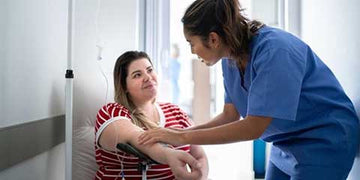Self-Care in the Hospital: Tips for Recovering from Weight Loss Surgery
by Anthony Benjamin on Oct 12, 2022

Self-Care in the Hospital: Tips for Recovering from Weight Loss Surgery
The length of your weight loss surgery recovery depends upon the type of surgery you chose. Typically, patients spend one to three days in the hospital before being discharged home.
While you are in the hospital, take advantage of the time for self-care as you are recovering from weight loss surgery. The following tips will help you maintain your health and well-being while you are in the hospital and prepare you for returning home.
 Get
Out of Bed
Get
Out of Bed
Your nurses are there to help you recover from surgery. They will encourage you to get out of bed and walk within eight to ten hours after surgery. This activity helps promote blood flow of oxygen throughout the body and stimulates circulation, which aids in quicker healing. Walking also helps your body rid itself of the carbon dioxide gas that may have been used to inflate your abdominal cavity during surgery.
It’s not uncommon to experience pain after surgery, but the pain shouldn’t keep you from getting out of bed. Consider taking your prescribed medicine 30 minutes before walking and before the pain escalates.
Also, keep a pillow nearby to hold against your stomach when you cough or sneeze. By placing gentle pressure over your incision, you can help to reduce the pain these activities can cause.
Practice Deep Breathing & Coughing
Your nurses will teach you how to deep breath and cough. This exercise opens up the air passage in the lungs, increases the blood and oxygen supply to the lungs, and boosts circulation. When you deep breath and cough, you lower your risk of pneumonia and infection. You will be instructed to do this activity on your own every hour or so with an incentive spirometer.
 Stay Hydrated
Stay Hydrated
As an essential nutrient in our diet, water is required for proper body functions and to prevent dehydration. The fluid goal for optimal hydration after surgery is 64 fluid ounces per day.
Hydration after surgery proves to be a challenge for some now that you have a smaller stomach pouch. Space out your water intake, don’t drink water with your meals, and wait for 30 minutes after eating to drink. You may also find it helpful to keep a bottle of water within easy reach. To prevent pain and regurgitation, sip water (and any fluid) instead of gulping it down.
Be on the lookout for symptoms of dehydration that include:
- Dry mouth
- Sleepiness and tiredness
- Thirst
- Headache
- Dry skin
- Dark yellow or amber-colored urine
Getting Enough Sleep
If you’ve ever spent the night as a patient in the hospital, you know that getting sleep can be difficult. You are in a bed that’s not your own, and your surgery may prevent you from sleeping in the position you find most comfortable. Also, a good night’s sleep can be interrupted by nurses checking your vital signs, noises in the hallway, and beeping machines (to name a few).
Getting good sleep, however, is essential for your recovery. Your well-rested body is better equipped to prevent or fight off an infection. Furthermore, when rested, you will also be able to participate in your recovery activities and better manage your pain.
The following are some tips to help you get enough sleep while you are in the hospital:
- Ask for medication to help you sleep
- Stay awake during the day and sleep at night
- Close the door to your room
- Use earplugs
- Request no visitors in the late evening and early morning
- Adjust the temperature
- Ask for pain medicine at bedtime
Having Visitors
Visitors can help you recover faster and lower anxiety and stress when you are in a cold, sterile environment. Many hospitals have flexible visitation policies that allow families and friends to visit in the morning into the evening.
While visitors can bring benefits, they can also bring potential risks if they are contagious or if they stay too long, and you are unable to rest.
Before inviting everyone to visit, wait until you are in your hospital room and see how you
feel. Then encourage family and friends to come to see you if you feel up to the
company.
Let ProCare Health Be a Part of Your Recovery
We are happy that you are on the road to recovery. At ProCare Health, we know weight loss surgery will transform your life and are honored to be a part of your new life journey! Please contact us today with questions, to get a free sample, or to place an order.










